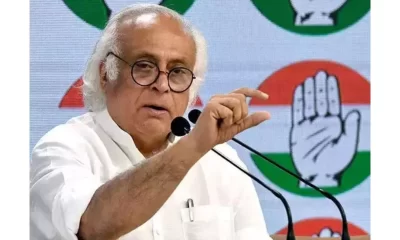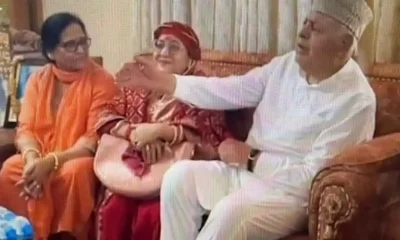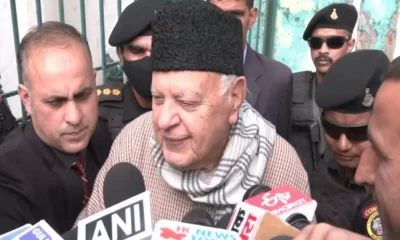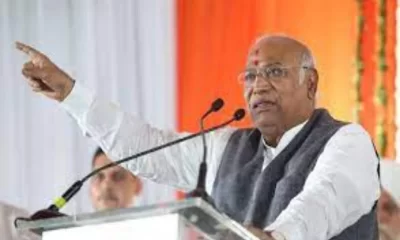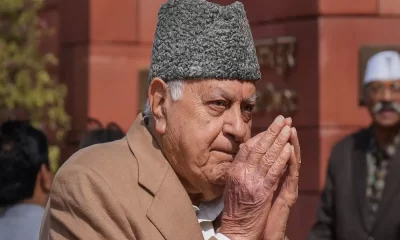India News
“In Kashmir, we have lost an entire generation”
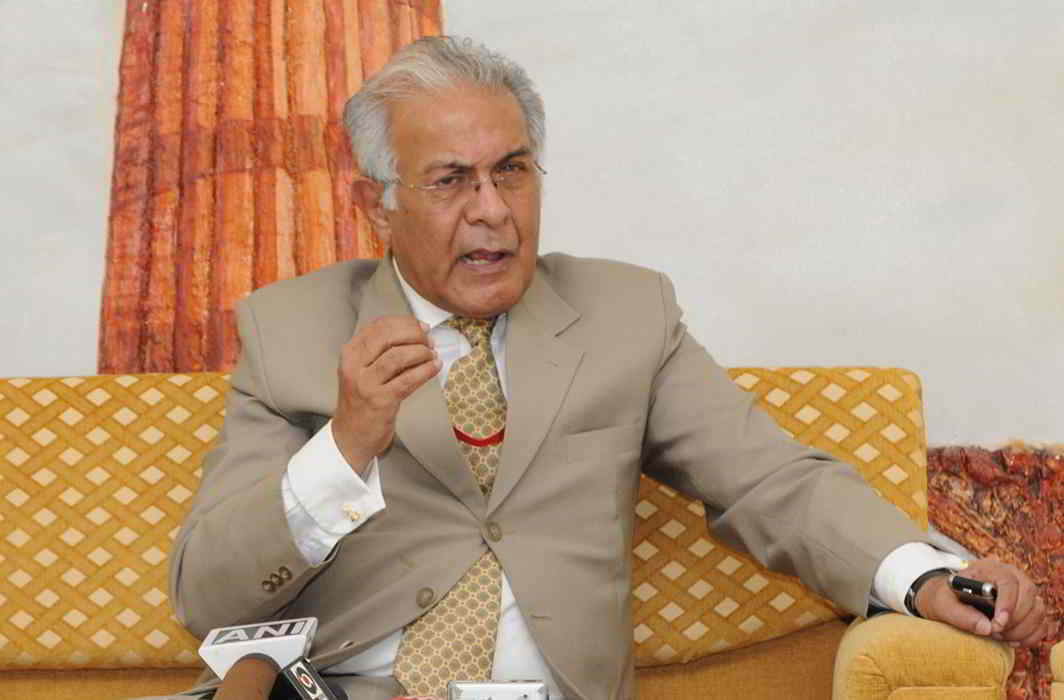
[vc_row][vc_column][vc_column_text]Former bureaucrat and old Kashmir hand Wajahat Habibullah is extremely disturbed by the recent developments in the Valley. He has brought out a book tragically titled, My Kashmir: The Dying of the Light. In an interview with Rashme Sehgal he examines why things have gone so wrong in the state.
Why has the situation in Kashmir been allowed to deteriorate to this extent?
Last year I visited the valley in the month of March. The atmosphere was so peaceful. I went to south Kashmir and wandered around the villages feeling very comfortable and safe. If something was simmering, I could not sense it.
The death of Burhan Wani sparked off a feeling of outrage, and of course, (so did) the use of pellet guns (by the armed forces) which have maimed and killed so many children. We are dealing with a new generation. With the earlier generation, we engaged with the Hurriyat, with the political leadership promising greater autonomy and so on. But today, the situation is very different. We seem to have lost an entire generation.
The younger generation does not want to engage in any kind of dialogue?
In 2010, a lot of young people took part in an agitation and many of them were arrested. I was in touch with Omar Abdullah. He was all set to resign and I persuaded him not to do so. His government had just passed the Juvenile Justice Act which stipulated that young people who were arrested would be lodged in juvenile homes. His government could have ensured that these children were lodged in vacated police or army barracks converted into juvenile homes. Instead these kids were arrested under the Public Safety Act and put in jails with convicted murderers and other criminals. This provided the fuel. No one in the government had foreseen these consequences. At that time Srinagar was under a lady commissioner. I had told her that she must reach out to these young boys, they will abuse you but even if they abuse you, they will feel somebody cared for them. She did not listen to me.
Many of these young people have gone on to lead this present agitation. This is what happened with Burhan Wani. When he lost his elder brother, he joined a terrorist organisation.
I have been advocating the restoration and strengthening of the democratic processes, the strengthening of panchayat institutions and so on but these and other groups are not being allowed to function. This has left the present agitators disenchanted with democracy to the extent that they would like to leave India.
Would they like to be part of Pakistan?
They have no clarity. They are bright, intelligent people. Nothing is talked of—democracy has been given a free flow.
Why is the word azadi so frightening? Why are people so scared with the word azadi? We celebrate August 15 as Independence Day. The Urdu word for independence is azadi. The political leadership is too terrified to reach out to these people. The elected politician is terrified. Nor has the bureaucracy made any attempt to reach out to the people. The system has not been allowed to reach out to the public. The whole structure has not been allowed to function.
The younger generation has seen the same lot of people being elected and all they have done is oppress them. Both Mehbooba Mufti and Omar Abdullah wanted the removal of AFSPA—such a law should have no place in a democracy but this was not done. The Public Safety Act should have been amended to ensure it cannot be applied to children.
What is your reaction to the video of a stone-pelter being tied to an army jeep and being paraded?
It’s very reprehensible. The security forces must remember that they are dealing with very young people.
During the 90s, when insurgency broke out, leaders were not necessarily educated unlike this younger generation which is very educated. We could dialogue with them but they are in the throes of a tremendous sense of disillusionment. Their target is the country itself.
People say the only person who can save the situation is National Conference leader Farooq Abdullah?
Farooq has a good grasp of the situation. I have discussed the matter with him. He understands the situation. He knows what to do. But that is not good enough. He cannot do it alone. Today the entire leadership is under a challenge. Those who stand for India must stand together.
It is well known that Kashmir is being run by the Ministry of Home Affairs. Why are they not doing anything?
Since the 60s, the state has been run by the Ministry of Home. Though governance depends on the chief secretary and the chief ministers, some CMs are stronger, some not so strong. Ever since the Hazratbal agitation, the Ministry of Home Affairs’ running of this state has been intensified.
Was the ministry unaware that the leadership has shifted to this younger lot?
These young people have been born after 1990 and they have seized the leadership. They have spread to the rural areas and to every corner of the valley.
When Jagmohan was Governor of J&K, he kept imposing curfew in the cities. I had argued with him that by doing so he was allowing insurgency to move to the rural areas. With this younger generation, it has now expanded to rural areas which have become the fountainhead of insurgency.
This problem started with Mufti Mohammed Sayeed when he was Home Minister. He was never the leader that the media portrayed him to be and many of these problems arose during his tenure.
Today’s situation is not a repeat of the past, in many ways it is much worse.
I have been covering J&K from 1996. But by 2009, when I went to the valley to cover the state elections, I found a tremendous change on the ground. Every village had a young man who could be a Wahabi from across the border who was monitoring what the villagers were telling me. And this was something I experienced across 15 to 16 villages.
If indoctrination was taking place for which our neighbours were responsible, what were we doing? Why was our bureaucracy, the DCs, tehsildars and all those people working in the field not reaching out to our young people?
I was speaking to Shah Faizal (he came first in the IAS exams in J&K), who is currently director in the education department and he said this kind of outreach is not taking place any more. The police have been asked to confront these young people since the civil authorities are not going out any more. If we are not willing to engage them, then they will want to select their own sarkar.
What is amazing is that the central government has chosen to remain quiet over these goings-on. This is all the more surprising because Minister of State Dr Jitendra Singh who hails from Jammu is the minister in charge of the prime minister’s office?
Yes. Dr Singh’s own brother is one of the main advisers of Omar Abdullah. Singh would have a very good understanding of the situation.
Surely the Indian government realises the geo-political implications of what is going on.
Our own children are being killed. A complete polarisation has taken place in the valley. What images are we sending out to the world—the security forces pitted against young people, with nothing in between. Everything in between has been washed away or become irrelevant.
The situation has become very complex, especially with the new US President in office.
Yes, the situation is very difficult. I cannot give a fixed answer… Trump will not wait for the situation to get out of control (in the valley), he will act before that. Nikki Haley, the US permanent representative to the UN, has already given an indication by saying the US is willing to help de-escalate tension between India and Pakistan. India needs to tune its own foreign policy towards what is happening around it. I have grave apprehensions about the future.
Do the Kashmiris fear that the government is moving towards a Hindu Rashtra?
That is what Farooq Abdullah has also said. This is part of the whole disillusionment with India and Indian democracy, this is all part of it. Even if AFPSA is removed, young people believe they will only be second class citizens here. This is what Pakistan has been telling them all along. Now Pakistan is saying ‘dekho kya ho raha hai’. When Kashmir had acceded to India, the choice was not between a Hindu and a Muslim state but a secular state.
Farooq Abdullah, son and heir of Sheikh Abdullah who had chosen to accede to India, has said on record that these are not the terms on which we had acceded. Certainly the national leadership has to understand this.
PM Modi has repeatedly said these (stone pelters) are our own people, our own children but we should treat them like that, too.
Image courtesy: PIB[/vc_column_text][/vc_column][/vc_row]
2024 Lok Sabha Elections
Lok Sabha election 2024: Nearly 50% voter turnout recorded in second phase till 3 pm
The constituencies going to polls today include all 20 Lok Sabha seats in Kerala, 14 in Karnataka, 13 in Rajasthan, and others spread across different states.
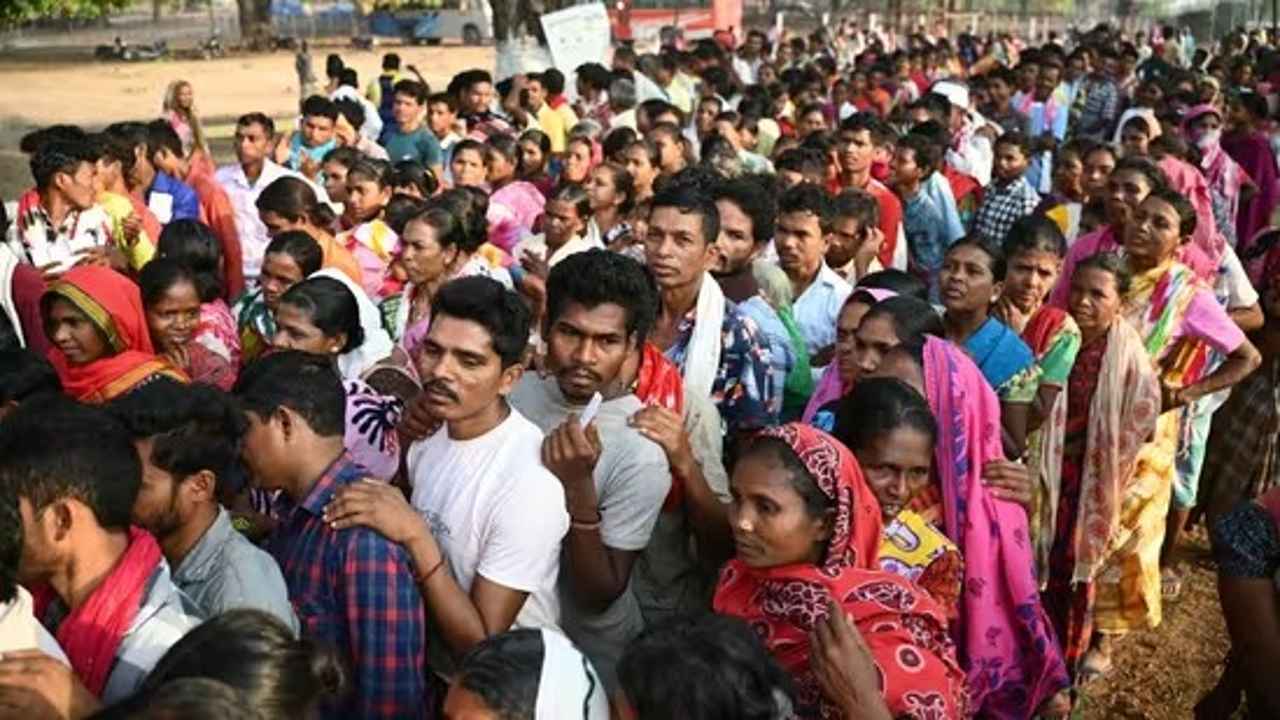
In the second phase of Lok Sabha elections 2024, over 50% of voters were registered in 13 states and the UTs till 3 p.m. 65% of voters participated in the first round of the Lok Sabha elections.
The 18th Lok Sabha elections are currently in their second phase, with voting for 88 seats taking place across 13 states and union territories. There are more than 1,200 people running for office, four of them are from outside Manipur.
Union minister Rajeev Chandrasekhar, BJP members Tejasvi Surya, Hema Malini, and Arun Govil, Rahul Gandhi and Congress leader Shashi Tharoor, DK Suresh, the brother of Karnataka Deputy Chief Minister DK Shivakumar, and former chief minister HD Kumaraswamy are among the notable contenders for the second phase.
In 2019, the NDA had won 56 of the 89 seats and the UPA 24. Six of these seats have been redrawn as part of the delimitation exercise.
The first phase of the seven stages of the elections took place on Friday, including 102 seats spread across 21 states and Union territories. Voter turnout was about 65.5% in the first phase, according to the reports.
In biggest festival of democracy, people from all walks of sector took part in it. A video went viral where former India captain and current Indian team head coach Rahul Dravid and former India player and head coach Anil Kumble were seen standing in line to cast their vote.
Meanwhile, voting started at 7 a.m. and will end at 6 p.m. The Election Commission has extended voting hours for those who are in line by an hour. According to Election Commission figures, the first two hours saw a 9.3% voter turnout throughout the 88 constituencies. By 9 am, Kerala had recorded 8.52%, Karnataka 9.21%, and Madhya Pradesh 13.82%.
In this phase, there were about 15.88 crore eligible voters, comprising 5.929 third-gender electors, 8.08 crore males, and 7.8 crore women. 3.28 crore young voters, aged 20 to 29, are among them; 34.8 lakh of them are first-time voters.
2024 Lok Sabha Elections
Lok Sabha elections 2024: 102-year-old man walks to polling booth to cast his vote in Jammu
The lowest voter turnout so far was noted in Ramgarh at 1.53%.
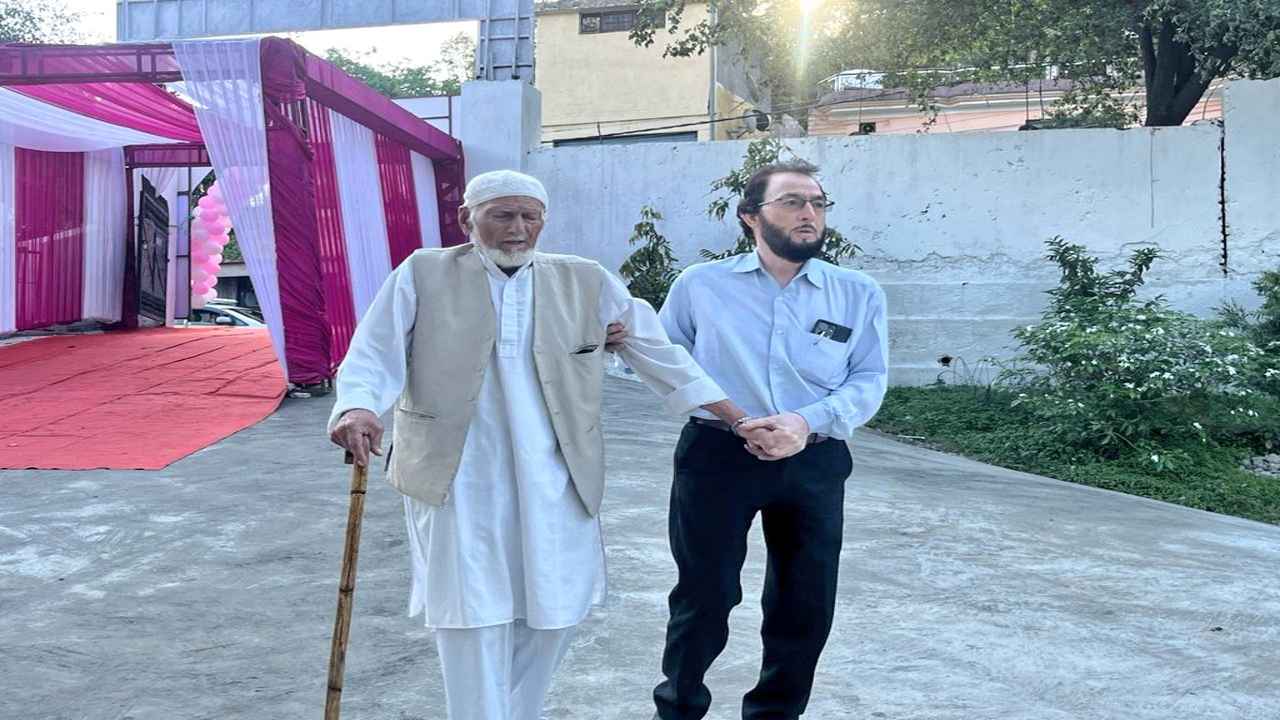
A 102-year-old man showed up at a Jammu polling place to cast his vote in the second phase of the Lok Sabha elections on Friday. Haji Karam Din arrived at the Reasi district polling place in the Jammu constituency with a walking stick in hand and a family member who assisted him with the pre-voting process.
Haji Karam Din, who is 102-year-old, showed his inked finger and posed for pictures outside the polling booth after casting his vote. He said voting at this polling place at this age makes him very happy. He has always cast his vote. Even at the age of 102, this experience is still ongoing, he said.
Reasi district is a part of the Jammu parliamentary constituency, and 22 candidates are up for vote with around 17.81 lakh eligible voters.
BJP’s sitting member Jugal Kishore Sharma is aiming for a third term in office following wins in the elections of 2014 and 2019. Former minister and Congress candidate Raman Bhalla is his main opponent.
Voting in the Jammu-Reasi Lok Sabha constituency began with eager voters showing up at the polling places. Some of them were wearing traditional Dogra attire.
In 2,416 polling places around the constituency, voting got underway at 7 a.m., and 10.39% of the total votes were cast by 9 a.m. In the 2019 Lok Sabha elections, Jammu recorded a 74% voter turnout.
Following the repeal of Article 370 and the division of the former state into two Union Territories five years ago, this is Jammu’s first significant election.
The Akhnoor segment received the highest percentage of votes, 14.24%, followed by Reasi (14.13%), Gulabgarh (13.53%), Shri Mata Vaishnodevi (12.71%), Marh (12.31%), Samba (8.56%), R S Pura Jammu South (8.17%), and Suchetgarh (5.67%), according to the officials. Ramgarh recorded the lowest voter participation of 1.53% so far.
Low attendance was observed in the border areas of the districts of Jammu and Samba till nine in the morning, according to poll data.
The officials said that big lines of voters were observed at several polling places throughout Jammu city. Voters were observed heading towards polling places early in the morning.
India News
Salman Khan house firing case: NIA interrogates arrested shooters Sagar Pal, Vicky Gupta for three hours
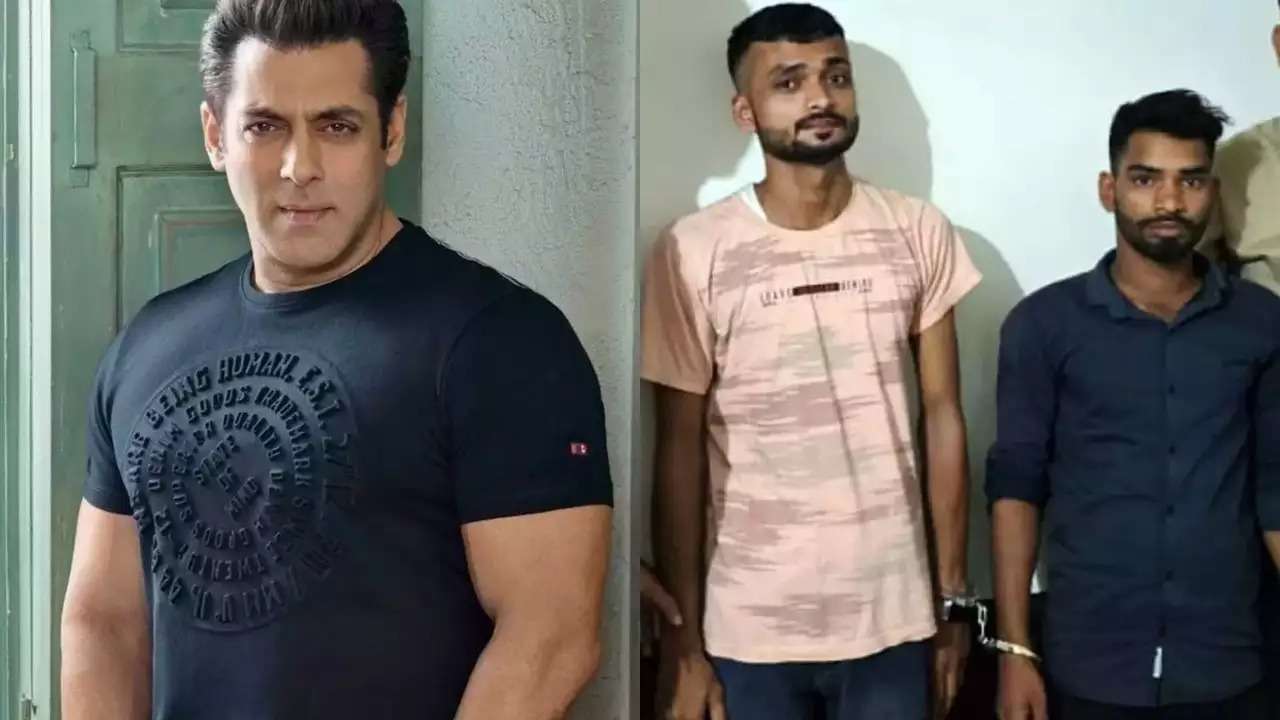
The investigation into the shocking firing incident that took place outside Salman Khan’s house on April 14 keeps bringing new updates with every passing day. In this case, Sagar Pal and Vicky Gupta, the two suspected shooters, have already been taken into custody.
The two shooters have reportedly been questioned by the National Investigation Agency (NIA), according to a new development. Every day that goes by, more information is revealed about the inquiry into the shocking firing incident that happened outside Salman Khan’s house on April 14. Sagar Pal and Vicky Gupta, the two accused shooters, are being held in custody after their first arrests.
It was recently discovered that the two shooters were questioned by the National Investigation Agency (NIA).
NIA has reportedly begun questioning Sagar Pal and Vicky Gupta, who were detained a few days ago for firing openly outside Salman Khan’s Galaxy Apartments in Mumbai, according to a recent update posted on their X (Twitter) account. NIA has interrogated shooters Vicky Gupta and Sagar Pal, arrested in the firing case, the tweet said.
According to the reports, two Punjabi residents were taken into custody by the Mumbai Crime Branch yesterday on suspicion of being involved in the recent shooting incident outside the house of Bollywood actor Salman Khan.
The two men, Sonu Subhash Chander and Anuj Thapan, provided guns to Sagar Pal and Vicky Gupta, the shooters, according to information released by the Mumbai Crime Branch. It was also reported that they had communication with the Bishnoi gang. For those who don’t know, hours after the incident, Anmol Bishnoi, the brother of gangster Lawrence Bishnoi, allegedly took credit for the firing in a Facebook post.
The shooters’ custody has been extended by Mumbai’s Esplanade Court until April 29.
Meanwhile, on the workfront Salman Khan was last seen in Tiger 3 alongside Katrina Kaif.
-
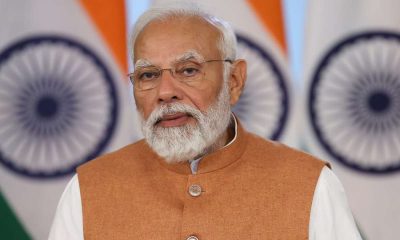
 2024 Lok Sabha Elections11 hours ago
2024 Lok Sabha Elections11 hours agoPM Modi calls for high voter turnout in second phase of Lok Sabha elections 2024, says your vote is your voice
-
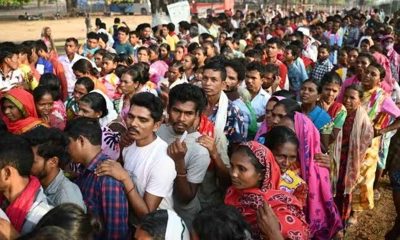
 2024 Lok Sabha Elections5 hours ago
2024 Lok Sabha Elections5 hours agoLok Sabha election 2024: Nearly 50% voter turnout recorded in second phase till 3 pm
-
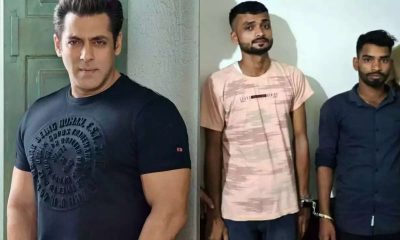
 India News10 hours ago
India News10 hours agoSalman Khan house firing case: NIA interrogates arrested shooters Sagar Pal, Vicky Gupta for three hours
-
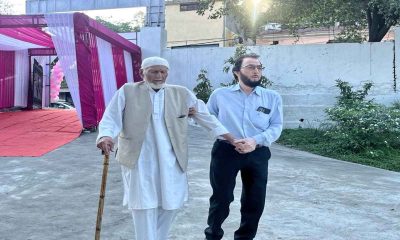
 2024 Lok Sabha Elections9 hours ago
2024 Lok Sabha Elections9 hours agoLok Sabha elections 2024: 102-year-old man walks to polling booth to cast his vote in Jammu
-
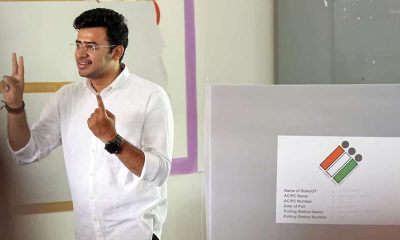
 2024 Lok Sabha Elections4 hours ago
2024 Lok Sabha Elections4 hours agoElection Commission books BJP MP Tejasvi Surya for seeking votes in the name of religion

